
Live Coverage: Arab-Islamic Summit Kicks Off in Doha, Qatar
Arab-Islamic Summit Condemns Israeli Strike in Doha as Regional Tensions Escalate
An emergency Arab-Islamic summit convened in Doha on Monday to address Israel's unprecedented attack on Hamas officials in the Qatari capital last week, marking a significant escalation that threatens to derail regional diplomatic progress and reshape Middle Eastern security dynamics. The strike has prompted widespread international condemnation and raised serious questions about sovereignty violations in neutral territories.
Qatar's Emir Denounces "Treacherous Aggression"
In his opening remarks, Qatari Emir Sheikh Tamim bin Hamad Al Thani characterized the Israeli operation as a "treacherous aggression" that was both "outrageous and cowardly." The Emir's unusually strong language reflects the gravity with which Qatar views the incident, describing it as a "serious violation of our sovereignty."
This marks a rare instance where Israel has conducted operations on Qatari soil, a country that has traditionally maintained a delicate balance in regional diplomacy while hosting various political factions and serving as a mediator in conflicts.
Diplomatic Fallout Threatens Normalization Efforts
According to a draft final statement obtained by international media, summit participants are expected to declare that the Israeli strike "undermines opportunities for achieving peace and peaceful coexistence in the region and threatens all achievements made toward establishing normal relations with Israel, including existing and future agreements."
This language suggests the incident could have far-reaching implications for the Abraham Accords and other normalization initiatives that have been central to reshaping Middle Eastern geopolitics since 2020. The statement indicates that Arab and Islamic nations may reconsider their diplomatic trajectory with Israel in response to what they view as a violation of regional sovereignty.
Historical Context and Precedent
The strike represents a departure from Israel's typical operational theaters and raises questions about the boundaries of its security operations. Unlike previous targeted operations in Syria, Lebanon, or Gaza, conducting such an attack in Qatar—a key U.S. ally and regional mediator—crosses new diplomatic red lines.
Regional Security Architecture Under Strain
The draft statement emphasizes "collective security and shared destiny" among Arab and Islamic nations, calling for unity in "facing common challenges and threats." This language suggests the incident may accelerate efforts to develop alternative security frameworks that exclude or minimize Israeli participation.
Foreign ministers from Arab and Islamic states held preparatory closed-door meetings on Sunday, indicating the level of coordination and seriousness with which regional powers are approaching this crisis. The emphasis on collective security reflects growing concerns about unilateral military actions disrupting regional stability.
Implications for Regional Mediation
Qatar's unique position as a mediator between various regional factions, including its role in facilitating negotiations between Israel and Hamas, may be compromised by this incident. The country has historically leveraged its neutrality to broker deals and maintain dialogue channels, but the sovereignty violation could force a reassessment of this role.
The incident also raises questions about the future of diplomatic immunity and neutral ground in regional conflicts, potentially complicating future peace negotiations and diplomatic initiatives across the Middle East.
Most Viewed News

 Sara Khaled
Sara Khaled






